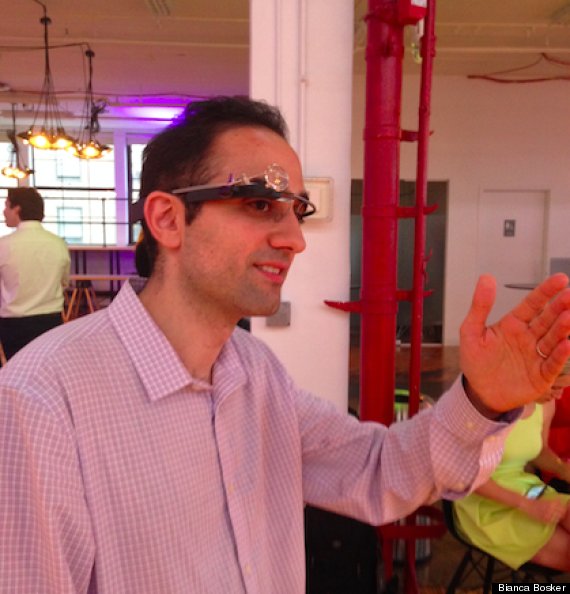
NEW YORK CITY -- Language undergoes strange mutations inside the airy Chelsea loft Google refers to as “Basecamp.” People who’ve paid $1,500 for Google’s prototype head computer are “Explorers.” At a gathering of Explorers at Basecamp last Thursday, attendees didn’t exchange business cards, but “dead trees.” They nodded at observations like, “He’s one of the most intelligent people on the planet even without his augmentations” or “A website is still a barrier -- you can't see the other side.”
Ron Khordi, one of the Explorers at the Google event, offered another unusual permutation of the English language when he described the bulky headband over his nose as an “elegant device.”
Glass has been pitched as everything from a teaching aid to a tool for runners. But not even Google is so bold as to claim it’s chic. Though Khordi wouldn’t consider Glass a stylish fashion accessory, he’s confident the Star Trek look of his head-mounted gadget offers a marketing advantage that will win over strangers who visit the website for his gem-sourcing company, Diamond Concierge Service.
“It just looks cool,” said Khordi, pointing to the gadget over his eyebrows. “It’s hands free. It’s a very elegant device. It’s on my head.”
In a sea of people wearing strange things on their faces, Khordi boasted the strangest. He had not one, but two pieces of glass dangling over his right eyeball. One was put there by Google, which sold Khordi the Glass headset in January. The second was a clip-on Bausch & Lomb jeweler’s loupe Khordi had attached to Glass with stainless steel rods and some protruding screws.
 Khordi shows of his customized pair of Glass.
Khordi shows of his customized pair of Glass.
The stereotype of the Silicon Valley-obsessed "Glasshole" secretly snapping photos with a wink of the eye doesn't apply to Khordi. When he’s not an Explorer, Khordi is a second-generation jeweler who, in his words, has “always been exploring how to use technology to disrupt the jewelry industry.” In practical terms, that means Khordi's Diamond Concierge Service uses Glass to video chat from jeweler's stores and film the gems Khordi finds for his clients. His site features colorful photos of Khordi wearing Glass while peering into shop windows. It boasts that his is “the first jewelry company to be a Glass Explorer.”
Sure, Khordi said, he could film the diamonds with his Samsung smartphone. But how bizarre would that look?
“Imagine that if I had this,” he said, shaking his phone. “That looks weird! It’s kinda creepy almost! You’re taking a phone and photographing into someone’s windows!"
Because it’s hands-free and still a futuristic-looking novelty, Glass is “very appealing,” said Khordi. In the diamond business, "there's no difference between me and anyone else. It's how you present yourself."
“That’s a good enterprise case,” murmured a Google spokeswoman in response.
"You should be recording this," said Khordi, with a nod toward the Glass on my face. "You don't have to write this. What are you doing? You're wearing Glass! Come on!"
The Explorers hadn’t really been invited to Basecamp to discuss Glass' enterprise cases. Google had planned the afternoon to show off Glass apps that would make the device a handy travel accessory. At one station, a Googler demonstrated Glass’ translation skills by pointing Explorers' face-cameras toward photos of street signs. After several minutes of installing and loading software, Glass was able to reveal that the Russian word next to the symbol “R/X” meant “pharmacy.”
The Explorers were more interested in talking business.
“If you go to the Glass app store, there are two apps for your golf score, two apps for cycling, three apps for cooking. Where's the to-do list? Where's the app for remembering what you're supposed to be doing?” said a self-described "hacker-in-chief," who, in addition to Glass, wore a black plastic contraption with levers and dials strapped to his arm. “Why does Google want to distract us? All I can say is, Google is more focused on joys, toys, fun.”
Khordi complained that Google had pulled Glass’ video-calling app less than a month before, making it almost impossible for him to stream live video to his clients.
“My entire business model depended on this,” Khordi said.
“Listen, we’re perfecting it," the Google spokeswoman told him.

The "hacker-in-chief" shows off a wearable computer he calls the "smartwatch" that he built himself.
Khordi has also relied on Glass to reply to clients in a matter of seconds. When someone contacts Khordi through his homepage, he gets a text message with that person's details delivered to his phone. Next, “that text is Bluetoothed to Glass up to my face,” Khordi said, so he can call the customer before she’s even left his page.
“It’s happened that people pick up the phone and they’re laughing. They’re like, ‘How’d you get to me? I’m on your website,’” he said.
“That’s an interesting use case,” another Google employee mused.
I ask Khordi why he couldn't just read the text message on his phone. The optics of that aren't ideal, either, he explained.
"Is this nice?" he asked, holding up his smartphone so it blocked eye contact. He jabbed a finger toward the double-decker pieces of glass over his right eye. "I just got a text for a $10,000 lead."
Really?
"It doesn’t matter. You have no idea," he said. "It’s a subtle difference, but diamonds are all about the subtlety. The subtlety makes or breaks the product."
